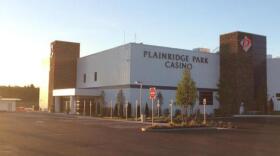State regulators are expected to license three new casinos in upstate New York on Monday.
Almost exactly one year after giving the initial go-ahead to three projects, New York is expected to release casino licenses later today. Here's a look back at the initiative that took the Empire State and Schenectady down the path to legalized gambling.
In November 2013, 57 percent of New York voters approved a constitutional amendment backed by Governor Andrew Cuomo to expand casino gambling, an effort supporters argued would bring desperately needed jobs to economically distressed areas upstate.
The thinking was gambling would bring thousands of jobs and millions of dollars that would be used to improve schools, help local governments fund critical services, and lower property taxes.
New York already had five upstate Indian-run casinos, which had enjoyed a 20-year monopoly of sorts, and several "racinos" — slot machine gambling halls at race tracks.
By September 2014, three gaming halls were proposed for the Southern Tier, four in the Albany-Saratoga Region, and nine in the Catskills and Hudson Valley region.
There was opposition from citizens in areas where some of the casinos were proposed; including strong resistance in East Greenbush and Saratoga Springs, already home to a racino. Two other Capital Region-area hopefuls fell: Amsterdam and Howe Caverns.
Albany was also subject to talk of erecting a hall at the old Tobin meat packing plant, and when that crashed, a proposed gaming hall and water park near Thruway Exit 23, to be run by the Chickasaw Nation in Oklahoma. Mayor Kathy Sheehan: "The city was informed ... by a representative from OTB that they are no longer considering the Exit 23 site for casino development and they also informed us that they were instead going to pursue an application for the Rensselaer site located across the river."
Days after the Exit 23 project collapsed, Schenectady took a key step in luring Vegas-style gambling to the "electric" city: a proposed casino complex would be erected at the old ALCO site along Erie Boulevard. Developers promised the "Rivers Casino & Resort at Mohawk Harbor" would include a hotel and TV studio along with residential and commercial space.
Sheehan, whose city saw one missed casino opportunity after, said she believed Schenectady is close enough to benefit the capital, where a new Convention Center is being built. "... so we'll be closely working with them to ensure that residents in Albany have access to jobs and that businesses here have access to be suppliers to the casino, and that our entertainment venues also share in the economic benefits."
Schenectady's bet paid off: the state’s Gaming Facility Location Board convened in Albany about a year ago. "... this board recommends Rivers Casino and Resort"
Saratoga's Racino, which lost its bid for casino status, has embarked on an expansion plan in line with its current operation.
Assemblyman Angelo Santabarbara of the 111th district represents a large portion of the city. He sees the Rivers casino as a catalyst for economic and social revival not only for Schenectady, but the entire Capital Region. "It's going to really encourage people to come back to upstate cities, give them a second look, and see all that we have to offer."
Several studies have warned of gambling saturation in the Northeast, with Springfield, Mass. and perhaps northwestern Connecticut also pursuing casinos. Moody's Investor Services forecasts an "oversaturated'' market, and if Massachusetts' first casino, Plainridge Park, is any indication, the future for New York's gaming halls may not be so rosy after all: revenue from Plainridge Park casino’s 1,250 slot machines has fallen month after month since its opening.
Massachusetts officials have cut by nearly 40 percent the tax revenue they expect to collect from the casino.
And the Onieda aren't sitting idly by: in June they opened the $20 million Yellow Brick Road Casino just outside of Syracuse in Chittenango, 60 miles east of Tyre, where the state OKed construction of the Lago Resort and Casino. The two entities have been engaged in a media feud over jobs and fairness.






